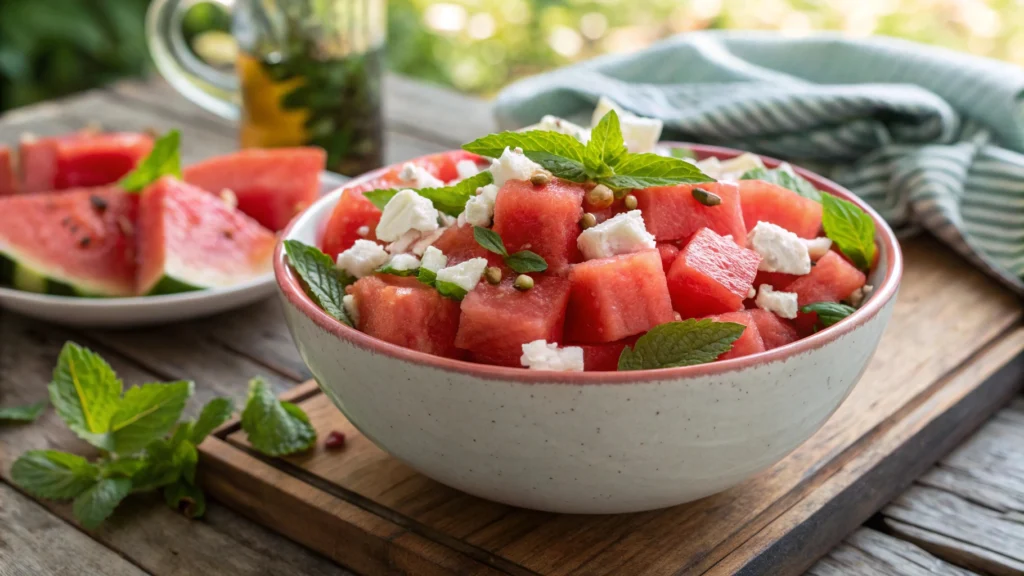Is Watermelon Healthy? Exploring the Nutritional Benefits and Health Impacts
Is Watermelon Healthy? , Watermelon is more than just a refreshing summer treat. It’s packed with nutrients that can boost your health in surprising ways. In this article, we’ll dive into why watermelon is considered a superfood, how it supports hydration, and whether it’s good for weight loss. We’ll also explore the different types of watermelon, like yellow watermelon and purple watermelon, and their unique benefits. By the end, you’ll see why this juicy fruit deserves a spot in your diet. Let’s get started!
Introduction to Watermelon and Its Nutritional Profile
What Makes Watermelon a Unique Fruit?
Watermelon is a fascinating fruit. Did you know it’s also considered a vegetable? That’s because it belongs to the gourd family, just like cucumbers and pumpkins. This dual classification makes it stand out in the produce aisle. Plus, its high water content—about 90%—makes it incredibly refreshing. Whether you’re enjoying a slice on a hot day or blending it into a smoothie, watermelon is a hydrating powerhouse.
Another fun fact: watermelon comes in many colors. While the original watermelon is red, you can also find yellow watermelon, purple watermelon, and even green watermelon. Each type has its own unique flavor and nutrient profile. For example, yellow watermelon is sweeter and contains more beta-carotene, which is great for eye health.
Key Nutrients in Watermelon
Watermelon isn’t just water—it’s packed with vitamins and minerals. First, it’s rich in vitamin C, which boosts your immune system and keeps your skin glowing. It also contains vitamin A, essential for good vision, and vitamin B6, which helps your body convert food into energy.
In addition, watermelon is a great source of potassium and magnesium. These minerals help regulate blood pressure and support heart health. But what really sets watermelon apart is its antioxidants. Lycopene, the pigment that gives red watermelon its color, is a powerful antioxidant linked to heart health and cancer prevention.
Compared to other fruits, watermelon is low in calories and sugar. A 100-gram serving has only 30 calories, making it a guilt-free snack. So, is watermelon healthy? Absolutely! Its nutrient density and low-calorie profile make it a fantastic choice for anyone looking to eat healthier.
Top Health Benefits of Watermelon

Hydration and Digestive Health
Watermelon is a hydration hero! First, its high water content keeps you refreshed, especially on hot days. Next, it helps your digestive system work smoothly. The water and fiber in watermelon make it easier for your body to process food. Plus, it’s a tasty way to stay hydrated without drinking plain water all day.
“Wondering if your furry friend can enjoy watermelon too? Check out our guide on Can Dogs Eat Watermelon? to learn more.”
Also, watermelon is gentle on your stomach. Unlike some fruits, it’s easy to digest. This makes it a great snack if you’re feeling bloated or sluggish. So, is watermelon healthy? Absolutely! It’s like a natural drink and snack in one.
Antioxidant Powerhouse: Lycopene and Beyond
Watermelon is loaded with antioxidants, especially lycopene. First, lycopene gives red watermelon its bright color. Then, it helps protect your cells from damage. This antioxidant is linked to heart health and may even lower the risk of certain cancers.
In addition, watermelon contains beta-carotene and vitamin C. These antioxidants support your immune system and keep your skin glowing. Even yellow watermelon has unique benefits, like more beta-carotene for eye health. So, whether you choose red or yellow melon, you’re getting a boost of good stuff.
Supports Heart Health and Blood Pressure
Watermelon is a heart-healthy fruit. First, it’s rich in potassium, which helps regulate blood pressure. Then, its magnesium content supports muscle and nerve function. Together, these minerals keep your heart working smoothly.
Also, watermelon is low in sodium and fat-free. This makes it a great choice for anyone watching their heart health. Plus, the amino acid citrulline in watermelon helps relax blood vessels. This can improve blood flow and lower blood pressure. So, is watermelon healthy for your heart? You bet!
Aids in Muscle Recovery and Exercise Performance
Watermelon is a fantastic post-workout snack. First, its high water content helps rehydrate you after exercise. Then, the amino acid citrulline reduces muscle soreness. This means you’ll feel less achy after a tough workout.
In addition, watermelon provides natural sugars for quick energy. It’s also low in calories, so you don’t have to worry about overeating. Whether you’re a gym enthusiast or just enjoy a walk, watermelon can help you recover faster.
Is Watermelon Good for Weight Loss?
Low-Calorie Snacking Option
Watermelon is a weight-loss-friendly fruit. First, it’s low in calories—only 30 calories per 100 grams. Then, its high water content makes you feel full without overeating. This makes it a perfect snack if you’re trying to cut calories.
Also, watermelon is naturally sweet. This means you can satisfy your sweet tooth without reaching for sugary treats. So, is watermelon healthy for weight loss? Yes! It’s a delicious way to stay on track with your goals.
Fat-Burning Properties of Arginine
Watermelon contains an amino acid called arginine. First, arginine helps your body burn fat more efficiently. Then, it supports muscle growth and repair. This makes watermelon a great addition to a weight-loss diet.
In addition, arginine improves blood flow. This can boost your energy levels during workouts. So, if you’re looking to shed a few pounds, watermelon might be your new best friend.
Healthy Dessert Alternative
Watermelon is a guilt-free dessert option. First, it’s naturally sweet and refreshing. Then, you can get creative with how you serve it. Try freezing watermelon slices for a cool treat or blending it into a smoothie.
Also, watermelon pairs well with other healthy foods. Add it to a salad with mint and feta cheese for a light, satisfying meal. So, is watermelon healthy as a dessert? Absolutely! It’s a fun and tasty way to end your day.
Exploring Different Types of Watermelon
Traditional Red Watermelon
Red watermelon is the classic favorite. First, it’s juicy, sweet, and perfect for summer picnics. Then, it’s packed with lycopene, the antioxidant that gives it its vibrant color. This makes it great for heart health and skin protection.
Also, red watermelon is versatile. You can eat it fresh, blend it into smoothies, or even grill it for a smoky twist. So, is watermelon healthy? Yes, and the original watermelon is a delicious way to enjoy its benefits.
Yellow Watermelon: A Unique Variant
Yellow watermelon is a fun alternative to the classic red. First, it has a sweeter, honey-like flavor. Then, it’s rich in beta-carotene, which supports eye health. This makes it a great choice if you’re looking for something different.
In addition, yellow watermelon seeds are edible and nutritious. They’re packed with protein and healthy fats. So, if you’re curious about yellow watermelon benefits, give it a try!
Purple and Green Watermelons
Purple and green watermelons are rare but exciting. First, purple watermelon has a deep, rich color and a unique flavor. Then, green watermelon often has a crisp texture and mild taste.
“By the end, you’ll see why this juicy fruit deserves a spot in your diet. Exploring the Different Types of Watermelon: A Comprehensive Guide.”
Also, these varieties are packed with antioxidants. They’re a fun way to mix up your fruit routine. So, is watermelon healthy in all its colors? Absolutely! Each type offers something special.
How Much Watermelon Should You Eat?
Daily Recommended Intake
Watermelon is healthy, but moderation is key. First, aim for 1-2 cups per day. This amount provides plenty of vitamins and hydration without overloading on sugar.
Also, balance watermelon with other fruits. This ensures you get a variety of nutrients. So, is watermelon healthy in the right amounts? Yes, it’s a perfect addition to a balanced diet.
Risks of Overconsumption
Eating too much watermelon can have downsides. First, its high water content might cause bloating. Then, its natural sugars can add up if you eat large amounts.
In addition, overeating watermelon might lead to digestive issues. Stick to the recommended serving size to enjoy its benefits without problems. So, is watermelon healthy when eaten in moderation? Definitely!
Watermelon as a Superfood
Comparing Watermelon to Other Superfoods
Watermelon holds its own against other superfoods. First, it’s packed with vitamins and antioxidants, just like berries. Then, it’s hydrating, which sets it apart from nuts and seeds. This makes it a refreshing choice for boosting your health.
Also, watermelon is low in calories compared to many superfoods. For example, avocados and nuts are healthy but high in fat. Watermelon, on the other hand, is light and easy to enjoy. So, is watermelon healthy enough to be called a superfood? Absolutely!
Incorporating Watermelon into a Balanced Diet
Adding watermelon to your diet is easy and fun. First, try it in salads with mint and feta cheese. Then, blend it into smoothies for a quick, refreshing drink. You can even grill watermelon slices for a unique twist.
In addition, watermelon pairs well with other healthy foods. Add it to yogurt for a filling snack or mix it with cucumber for a hydrating salad. So, is watermelon healthy when used creatively? Yes, and it’s a delicious way to stay nourished.
FAQs About Watermelon
Is it healthy to eat watermelon every day?
Yes, eating watermelon daily is healthy in moderation. First, it’s low in calories and high in water, making it a great snack. Then, it provides essential vitamins and antioxidants. Just stick to 1-2 cups per day to avoid overdoing it.
Does watermelon have a lot of sugar?
Watermelon has natural sugars, but it’s not excessive. First, it has less sugar than fruits like mangoes or grapes. Then, its high water content balances the sweetness. So, is watermelon healthy for those watching sugar? Yes, when eaten in reasonable amounts.
Is watermelon good for weight loss?
Watermelon is a weight-loss-friendly fruit. First, it’s low in calories and filling. Then, it contains arginine, which helps burn fat. This makes it a smart choice for anyone trying to shed pounds.
What are the best ways to store and serve watermelon?
Store watermelon in the fridge to keep it fresh. First, cut it into slices or cubes for easy snacking. Then, try freezing chunks for a cool treat. You can also blend it into juices or smoothies. So, is watermelon healthy and versatile? Absolutely!
Why Watermelon Deserves a Place in Your Diet
Recap of Watermelon’s Health Benefits
Watermelon is a true superstar in the world of fruits. First, it’s incredibly hydrating, thanks to its 90% water content. Then, it’s packed with vitamins like A and C, which keep your skin glowing and your immune system strong. Plus, its antioxidants, like lycopene, support heart health and protect your cells.
Also, watermelon is low in calories and sugar, making it a guilt-free snack. Whether you’re enjoying the original watermelon or trying yellow watermelon for its unique benefits, you’re making a healthy choice. So, is watermelon healthy? Absolutely, and it’s a delicious way to stay nourished.
Encouragement to Enjoy Watermelon
Adding watermelon to your diet is easy and fun. First, slice it up for a quick snack. Then, get creative by blending it into smoothies or adding it to salads. You can even experiment with different types of watermelon, like purple watermelon or yellow melon, to keep things exciting.
In addition, watermelon is perfect for any occasion. It’s great for summer picnics, post-workout refreshment, or even as a light dessert. So, is watermelon healthy enough to enjoy regularly? Yes, and it’s a tasty way to boost your overall health.
Final Thoughts
Watermelon is more than just a refreshing treat—it’s a nutrient-packed fruit that supports your body in countless ways. From hydration to heart health, it’s a simple yet powerful addition to your diet. So, next time you’re at the store, grab a watermelon and enjoy its many benefits. You’re going to love it!
